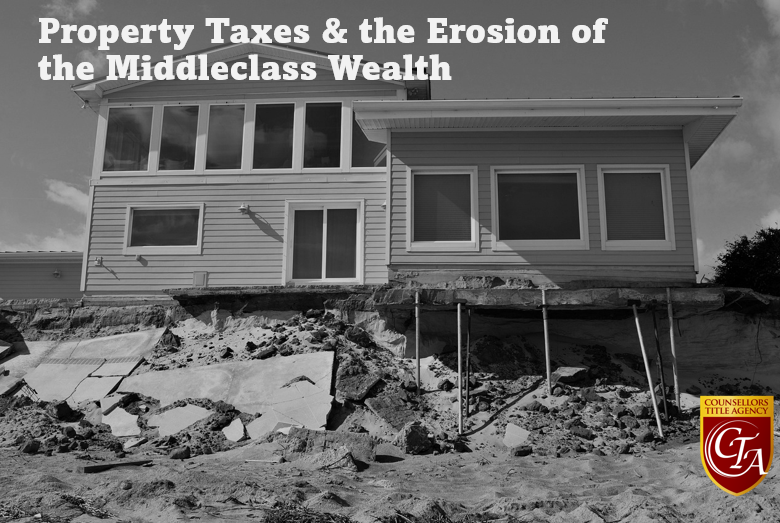 I
IGovernment’s War Against Homeowner Wealth
By Anthony DiMaio
Property Taxes the New Virus Infecting the Middleclass
Property taxes have long been a cornerstone of local government funding in the United States, providing essential revenue for schools, infrastructure, and public services. However, a growing body of evidence suggests these taxes are creating an unsustainable burden for middle and lower-class families, potentially undermining their economic stability and mobility.
The Disconnect Between Market Value and Assessment
Recent research reveals a concerning disconnect between property tax assessments and actual market values. Assessments often follow patterns unrelated to actual home values, creating unpredictable financial burdens for homeowners.
Even during economic downturns when home values typically decline, property tax revenues remain surprisingly UNCHANGED. While this stability benefits municipal budgets and services, it places continuous pressure on homeowners regardless of their financial circumstances or the actual market value of their homes.
Strategic Reassessments Following Ballot Initiative
The research uncovered a troubling pattern in districts where voters approved bond measures for schools. Homeowners in these districts were 5.8 percent more likely to face reassessments, with assessed values increasing by 1.2 percent on average—despite market values remaining flat. This suggests municipalities may capitalize on referendum passages to maximize revenue in anticipation of increased capital budgets, effectively raising taxes beyond what market conditions would justify.
Taxation Without Realization of Gains
One of the most problematic aspects of property taxation is its application to unrealized gains. When someone purchases a home for $250,000 and lives there for a decade, that property might increase in value by over 40 percent—a figure supported by recent Redfin data showing median U.S. home prices rising from $289,000 to $418,000 over five years (a 45% increase).
However, homeowners realize no actual financial benefit from this appreciation unless they sell their homes. Despite this lack of realized gain, they face continuously increasing property tax bills based on the theoretical value increase. This creates a situation where families are taxed on paper wealth they cannot access without selling their primary residence.
The Problem of Double Taxation
Adding insult to injury is the issue of double taxation. When homeowners eventually sell their property, they must pay capital gains taxes on the difference between the purchase and sale prices. This means they’re effectively taxed twice on the same asset appreciation—first through yearly property tax increases based on unrealized appreciation, and later through capital gains taxes when the appreciation is finally realized.
Disproportionate Impact on Middle and Working-Class Families
This system of “property taxfare” disproportionately affects middle and working-class families for several reasons:
- Fixed Income Challenges: Many middle-class retirees live on fixed incomes while their property values (and subsequently taxes) continue to rise, creating impossible financial situations.
- Percentage of Income: Property taxes consume a larger percentage of total income for middle and lower-class households compared to wealthier families.
- Limited Liquidity: Less affluent homeowners often have the majority of their wealth tied up in their homes with fewer liquid assets to cover increasing tax burdens.
- Geographic Displacement: Rising property taxes can force long-time residents out of gentrifying neighborhoods, disrupting communities and erasing generational ties.
Moving Forward: Potential SolutionÂ
While communities certainly benefit from well-funded public services, the current property tax system needs reform to avoid undermining the very economic stability it should help protect. Possible approaches include:
- Circuit breaker programs that cap property taxes based on household income
- Deferral options or frozen for seniors and low-income residents
- More transparent communication about how referenda and bond measures will impact individual tax bills
- New legislation that limits and prevents to tax on a value above the purchase price
- Better alignment between market values and assessed values
Without meaningful reform, property taxes risk becoming an increasingly significant factor in economic inequality, preventing middle and working-class families from building and maintaining wealth through homeownership—traditionally one of the primary paths to financial security in America.
If you have any questions about this information or title insurance, please contact Ralph Aponte: 732.914.1400.
Counsellors Title Agency, www.counsellorstitle.net, founded in 1996, is one of New Jersey’s most respected title agencies, serving all 21 New Jersey counties with title insurance, clearing title, escrow, tidelands searches, and closing and settlement services for commercial or industrial properties, waterfront properties and marinas, condominiums, townhouses or residential single-family homes. Counsellors Title also features its own Attorney Settlement Assistance Program™ [ASAP], which is an individual resource customized to fit the needs specifically of real estate attorneys, including, Documentation, Preparation, Disbursement of Funds, Attendance at Closing, HUD Preparation or Post-Closing Matters.
